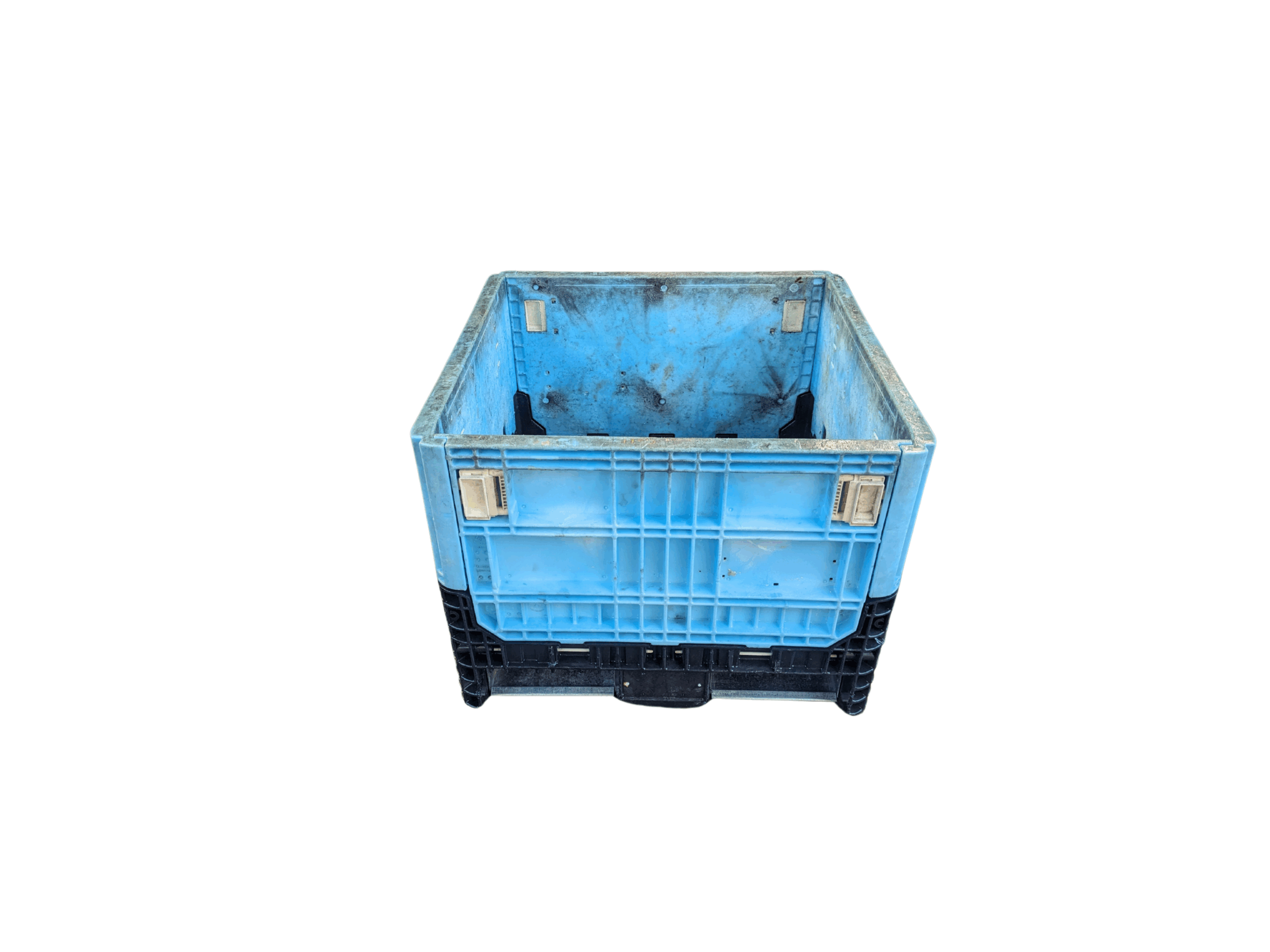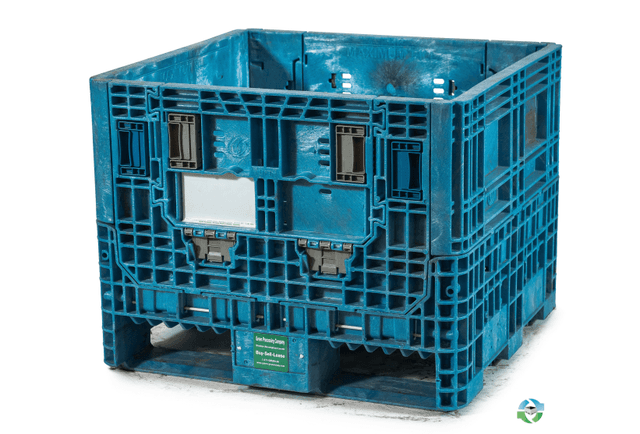How used collapsible bulk containers support eco-conscious operations
Wiki Article
Ingenious Solutions: Discovering the Versatility of Bulk Containers in Different Industries
Mass containers have actually become a critical advancement across multiple markets. Their design boosts storage space and transportation efficiency, catering to diverse needs while advertising sustainability. Services in farming, production, and logistics report significant enhancements in operational procedures. The real level of their influence may not yet be completely realized. Discovering the numerous applications and advantages of mass containers might expose insights that reshape industry requirements. What exists in advance for this developing option?Enhancing Agricultural Efficiency With Mass Containers
How can mass containers transform agricultural techniques? In the domain name of farming, mass containers serve as a crucial technology, boosting performance and sustainability. They allow farmers to store and deliver huge quantities of fertilizers, seeds, and grains, reducing the need for multiple smaller sized bundles that typically add to squander. By utilizing bulk containers, farming operations can enhance their supply chains, reducing handling expenses and time. These containers are designed for very easy loading and dumping, enabling swift shifts between different phases of farming processes.Bulk containers advertise much better stock administration, making sure that producers have ample supplies on hand without excess. This efficiency converts to reduced labor expenses and boosted productivity. In a sector usually challenged by rising and fall need and seasonal variants, the reliability and scalability used by mass containers provide a substantial advantage, empowering farmers to concentrate on top quality and yield.
Enhancing Production Processes Through Bulk Solutions
Bulk services play a vital role in simplifying manufacturing processes by helping with efficient product handling and giving cost-effective storage space choices. These containers assist preserve an orderly production setting, eventually enhancing workflow and performance. As sectors progressively adopt mass services, they are likely to experience significant improvements in functional efficiency.Efficient Material Handling

Effective product handling is important for maximizing manufacturing processes, as it directly affects productivity and cost-effectiveness. Using bulk containers can considerably streamline operations by simplifying the movement and storage of materials. Their layout enables for very easy loading and unloading, minimizing the moment employees spend dealing with specific products. This efficiency not only reduces labor expenses however also enhances process, allowing makers to respond promptly to demand fluctuations. In enhancement, bulk containers promote much better organization within centers, promoting quick access to materials and decreasing downtime. By carrying out these functional solutions, manufacturers can boost total operational efficiency, ensuring that assembly line run smoothly and efficiently while decreasing waste and resource expense. Consequently, bulk containers play an essential function in enhancing product handling methods.
Affordable Storage Solutions
As manufacturers seek to optimize their procedures, affordable storage space solutions come to be increasingly essential. Bulk containers offer a useful ways of saving large quantities of materials, reducing the need for several smaller sized storage systems. This consolidation brings about reduce supply prices, as mass containers often need much less handling and result in lowered labor expenditures. Additionally, their standard dimensions assist in effective piling and storage, optimizing stockroom area. By utilizing bulk containers, suppliers can reduce waste and enhance the general organization of their centers. These containers are likewise made for durability, which can reduce substitute prices over time. On the whole, integrating mass containers right into storage methods enables producers to streamline procedures while preserving success and efficiency in their supply chains.
Improved Manufacturing Workflow
Making use of bulk containers significantly boosts production workflows by simplifying the monitoring of materials throughout the production procedure. These containers assist in efficient storage space and transport, decreasing the moment spent on handling products. Because of this, suppliers can accomplish quicker turnaround times and reduce hold-ups in production. Mass containers also promote far better company, permitting groups to conveniently access basic materials when needed, which additionally improves operations. Furthermore, the standard shapes and size of these containers enable enhanced use storehouse room, contributing to overall efficiency. By integrating bulk solutions right into their procedures, companies can enhance inventory control and lower waste, inevitably bring about boosted performance and a more active production setting.Transforming Food Solution Logistics
The food service industry is undertaking substantial transformation through the fostering of bulk containers, improving storage space abilities and maximizing room application. Efficient storage space services make it possible for companies to manage stock extra properly, while structured transport processes enhance and lower prices shipment times. Therefore, these innovations are reshaping logistics and driving better efficiency throughout the field.
Reliable Storage Space Solutions
Innovative storage space remedies are changing food service logistics by boosting performance and optimizing area application. Mass containers, designed for optimum ability, allow food solution companies to lessen squandered room while preserving simple access to products. These containers can be stacked and organized according to stock requirements, improving the storage process. In addition, their toughness warranties that food continue to be safe and secure and secure, reducing perishing and losses. With functions such as modular styles and compatibility with various shelving systems, these containers can adapt to diverse cooking area formats. By using efficient storage space services, food solution operations not just boost workflow but also boost total efficiency, guaranteeing that sources are made use of properly to meet client demands.Streamlined Transportation Processes
While lots of variables contribute to the effectiveness of food service logistics, streamlined transport procedures play an important role in enhancing supply chain operations. The adoption find this of bulk containers greatly improves the movement of goods, permitting quicker loading and discharging at distribution centers. Their standard sizes promote effective stacking and storage space, lessening wasted area during transportation. Additionally, bulk containers lower the demand for extreme product packaging, resulting in lower expenses and lowered ecological effect. By making sure that items are securely moved, they reduce damages and perishing, which is important in the subject to spoiling food sector. Overall, the combination of mass containers into transportation methods not only boosts functional performance but also supports lasting methods within the food solution sector.The Function of Mass Containers in Pharmaceutical Supply Chains
In the pharmaceutical sector, mass containers play an essential role in making sure the effective and safe transportation of raw materials and finished items. These containers are specifically created to meet rigorous governing needs, providing ideal security against contamination and destruction during transit. Their robust building and construction enables the protected transport of delicate materials, such as active pharmaceutical active ingredients (APIs) and intricate formulations, while minimizing the risk of damage.Bulk containers facilitate streamlined handling and storage operations within warehouses and manufacturing facilities. Their standardized sizes enable compatibility with automated systems, improving efficiency and decreasing labor expenses. By utilizing mass containers, pharmaceutical business can attain considerable price financial savings through bulk getting and minimized product packaging waste.
Promoting Sustainability in Packaging Practices
The pharmaceutical sector's enhancing dependence on bulk containers has motivated a wider assessment of sustainability in product packaging techniques across various fields. As business seek to reduce their ecological effect, ingenious strategies to packaging have acquired traction. Mass containers, created for reuse and recycling, present a sensible remedy. Their resilience extends item lifecycles, decreasing the requirement for single-use product packaging.Moreover, the shift in the direction of biodegradable materials and eco-friendly layers has ended up being important in the style of these containers. This adjustment not only addresses waste decrease but additionally lines up with consumer need for lasting items.
Industries such as food and cosmetics are taking on similar strategies, acknowledging that lasting packaging can enhance brand track record. Collaborative efforts in between vendors and suppliers even more promote sustainability, motivating the development of closed-loop systems - used collapsible containers. Inevitably, accepting sustainable product packaging methods is essential for promoting a round economy and alleviating the ecological footprint across diverse sectors
Cost-Effective Transport Solutions With Bulk Containers

Moreover, mass containers improve handling processes, leading to lowered labor prices and decreasing the threat of damages throughout transportation. Industries such as agriculture, chemicals, and pharmaceuticals benefit from the sturdiness and robustness of these containers, which can stand up to extreme conditions while making certain the stability of their components
The reusable nature of mass containers adds to lasting financial savings, as firms can depend on fewer, a lot more sturdy units instead than frequently changing single-use product packaging. By doing this, bulk containers not just boost performance yet also support overall expense management in supply chain operations.
Customization and Adaptability in Mass Container Design
While many bulk containers are developed for basic applications, their modification and versatility have come to be vital features for markets with special needs. Producers now use a variety of alternatives, enabling customers to customize containers to details measurements, materials, and capabilities. This adaptability enables services to optimize storage and transport procedures, ensuring compatibility with various managing systems.The food and pharmaceutical industries commonly need containers that meet rigorous hygiene visit and safety and security criteria. Custom-made layouts may include functions such as tamper-proof seals, easy-to-clean surfaces, and specialized ventilation systems. In the agricultural market, bulk containers can be tailored to assist in the transport of varied assets, from grains to fluids, boosting functional effectiveness.
her explanation Ultimately, the ability to personalize mass containers not only increases performance but additionally supports sustainability efforts by decreasing waste and maximizing resource usage throughout several fields. This flexibility positions bulk containers as versatile options in today's dynamic market.
Regularly Asked Concerns
What Products Are Bulk Containers Typically Made From?
Bulk containers are generally made from materials such as high-density polyethylene (HDPE), polypropylene, aluminum, or steel. These products supply toughness, resistance to chemicals, and the capacity to securely keep and transport numerous goods throughout markets.Exactly How Are Bulk Containers Cleaned In Between Uses?
Mass containers are typically cleansed utilizing high-pressure cleaning, heavy steam cleansing, or chemical sanitization techniques (used bulk containers). The cleaning process assurances that deposits are eliminated, protecting against contamination and maintaining the quality of materials for subsequent usages
Can Bulk Containers Be Recycled Multiple Times?
Yes, bulk containers can be recycled multiple times. Their robust layout permits for duplicated usage throughout various applications, provided they are correctly cleaned up and kept after each use to guarantee safety and health requirements.What Are the Weight Boundaries for Mass Containers?
Weight restrictions for mass containers generally range from 1,000 to 3,000 extra pounds, relying on the product and design. Requirements might vary by maker, so it is critical to get in touch with guidelines for certain container types.Exist Typical Sizes for Mass Containers?
Yes, there are basic dimensions for mass containers, normally ranging from 20 to 40 cubic feet. These dimensions promote reliable storage and transport across different markets, ensuring compatibility with equipment and maximizing space usage.Using mass containers can considerably enhance procedures by streamlining the activity and storage of materials. In enhancement, mass containers promote better company within centers, facilitating fast accessibility to products and minimizing downtime. Mass containers give a practical methods of storing large amounts of products, lowering the demand for several smaller sized storage space devices. The food service market is undertaking considerable improvement with the fostering of mass containers, enhancing storage space capacities and maximizing area usage. Bulk containers facilitate structured handling and storage space operations within warehouses and production centers.
Report this wiki page